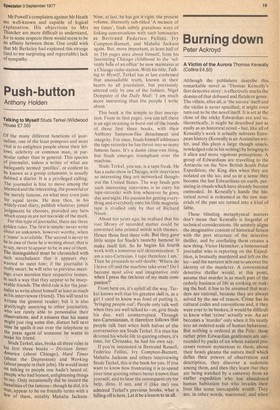Push-button
Anthony Holden
Talking to Myself Studs Terkel (Wildwood House £7.50) Of the many different functions of journalism, one of the least pompous and most vital is to enlighten people about their fellows, celebrity or common man, in particular rather than in general. This species of journalist, unless a writer of what are inelegantly termed 'profiles', or content to be known as a gossip columnist, is usually dubbed a diarist. It is a privileged calling. The journalist is free to move among the talented and the interesting, the powerful or the merely famous, on what may even pass tor equal terms. He may then, in his widely-read diary, publish whatever jotted Judgments he chooses, provided any facts Which creep in are not too wide of the mark.
For this type of journalist, there are three golden rules. The first is simple: never write about an unknown, however worthy, when a 'name' is available. The second is never to be in awe of those he is writing about; that is to say, never to appear to be in awe of them. The distinguished must be chronicled with such nonchalance that it appears they wanted to meet him; if the journalist is really smart, he will refer to previous meetings, even mention their respective homes, In such a way that they appear to be inseperable friends. The third rule is for the journalist to write about himself at least as much as his interviewee (friend). This will tend to irritate the general reader; but it is also gratifyingly annoying to other journalists, Who are rarely able to personalise their Observations, and it erisures that his name Tight just ring some dim, distant bell next time he spells it out over the telephone to the press agent of someone he wants to make his friend.
Studs Terkel, alas, broke all three rules in hsi first three books — Division Street: America (about Chicago), Hard Times (about the Depression) and Working (about people in their jobs). He would insist on talking to people one hadn't heard of, People who had honest, enlightening things to say. Only occasionally did he record the banalities of the famous—though he did, it is true, appear to be on friendly terms with a few of them, notably Mahalia Jackson. Now, at last, he has got it right, the present volume, discreetly sub-titled 'A memoir of my times', finds subtly gratuitous ways of linking conversations with such luminaries as Bertrand Federico Fellini, Ivy Compton-Burnett, and Mahalia Jackson again. But, more important, at least half of its 316 pages area about himself, from his fascinating Chicago childhood to the `solvenly hole of an office' he now maintains at a Chicago radio station. With his title, Talking to Myself, Terkel has at last enshrined that unassailable truth, known in their hearts to all journalists, but previously uttered only by one of the boldest, Nigel Dempster of the Daily Mail: 'I am much more interesting than the people I write about.'
This book is the temple to that inscription. From its first pages. you can tell there is an ego straining to burst out of the bonds of those first three books, with their Anthony Sampson-like detachment and integrity. For once, Studs himself addresses the tape recorder he has thrust into so many famous faces. It's a damn close-run thing, but Studs emerges triumphant over the machine.
Studs Terkel, you see, is a tape freak. He has a radio show in Chicago, with interviews so interesting they are networked thoughout the United States. The way Studs gets such interesting interviews is to carry his tape-recorder with him wherever he goes, day and night. His passion for getting everything and everybody onto his little magnetic tape is rivalled only by that of Richard Nixon.
About ten years ago, he realised that his vast library of recorded matter could be converted into printed words with themes. Hence those first three vols. But they gave' little scope for Studs's raunchy humour to make itself felt. So he begins his fourth work with a sonorous self-determination: 'I am a neo-Cartesian. I tape therefore I am.' Then he proceeds to self-doubt: 'Where do I leave off and the machine take over? Do I become most alive and imaginative only when I press the ON lever of my mute companion?'
From here on, it's uphill all the way. Tertel knows well that his greatest skill is, as a girl I used to know was fond of putting it, 'bringing people out'. People only talk well when they are well talked to —or, give Studs his due, well Uninterrupted. Through neo-CartesianiSm, it therefore follows that people talk best when both halves of the conversation are Studs Terkel, If a man has devoted his whole life to quoting others, it's time, for Chrissake, he had his own say.
If you're interested in Bertrand Russell, Federico Fellini, Ivy Compton-Burnett, Mahalia Jackson and others interviewing Studs Terkel, this is the book for you. If you want to know how frustrating it is to spend your time quoting others better known than yourself, and to hear the consequent cry for help, ditto. If not, and if (like me) you admired Terkel's previous books; what a falling off is here. Let it be a lesson to us all.






























 Previous page
Previous page